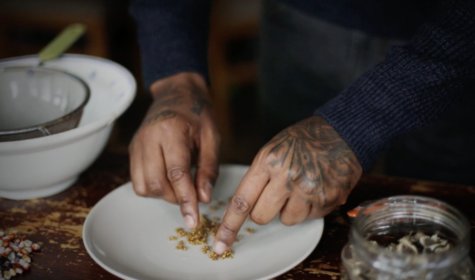Eating to Extinction
In this extract from his book Eating to Extinction: The World’s Rarest Foods and Why We Need to Save Them (Vintage, January 2023), food journalist, Dan Saladino, reveals the story of Esiah Levy. Seeing seed sharing and food growing as a route to empowerment, Esiah posted thousands of seeds to people around the world from his home in south London and received many in return. Esiah died aged just thirty-two in 2019 of sudden adult death syndrome. His legacy lives on through the seeds that he shared and the many people that he inspired.
Vegetables generate a different kind of emotional response in us than other crops. Cereals are often seen as fuel: a rich source of carbohydrate. Vegetables, however, in their many shapes, colours and textures, offer more obvious displays of beauty and diversity. As flavour-filled packages of essential vitamins and minerals, vegetables, more than meat, are what have sustained most humans. And they can be grown on small patches, unlike the large open spaces needed for wheat and other grains. So vegetables are the usual starting point for those in search of greater self-sufficiency. This was one of the reasons Esiah Levy began to grow vegetables. But his interest in these edible plants developed much further.
From his home in south London, he sent seeds around the world. Envelopes that had once held letters, bills and circulars were recycled and filled with a spoonful of landrace seeds: varieties of squash he’d discovered through his Jamaican relatives; jumbles of different corns, sweet, popping, red and ‘painted’; seeds for beetroot, rhubarb and peppers. He produced these seeds by growing plants wherever space allowed – in allotment plots; on the balconies of friends’ homes; along and up the garden fences of neighbours; inside an old shoe he had found; in the flower beds around his mother’s house. “It was like walking into The Secret Garden,” says Levy’s sister Syreeta. When he ran out of pots, he filled supermarket carrier bags with soil and grew seeds in those. He believed it wasn’t lack of space that prevented people growing food from seed, but lack of knowledge and desire.
It all began when a friend at work gave him a handful of seeds from a Blue Ballet squash. He planted them and watched them grow. “The flesh was amazing,” he remembered, “best roasted, so that the sweetness filled your mouth.” Inside his first home-grown squash he found hundreds of seeds and it didn’t feel right to throw them away. So, he began to give the seeds to other people. Before long, he was sharing his wonder at this miraculous journey from seed to plate with his two young children, and then with like-minded people online. By day, he worked for London Underground, where he looked after the signals, but at night he took to Instagram where he posted pictures of his open-pollinated seeds and the landrace vegetables from his miscellany of garden treasures. “I want to use what nature provides,” he posted to followers around the world. “Seeds are plentiful, and importantly, they’re free.”
All his followers had to do was ask and he would post them seeds – to Georgia, Germany, Jamaica, Morocco, Ghana, “to the world and beyond,” he once said, and maybe it wasn’t a slip of the tongue. When he watched stories of disasters on television news, he sent packets of seed to the communities affected. “When we care, we are at our most creative, and our imaginations are unlimited.”
Extract reproduced with kind permission from the publisher.
Watch the film
In this short film, filmmaker, Jason Taylor, shares more about the legacy left by Esiah Levy through the grassroots seed-sharing programme, SeedsShare, that he established and ran from his home in south London.


